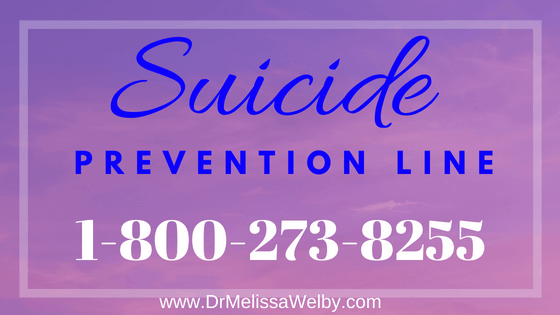As a psychiatrist, part of my job is to talk to people about suicide. In my profession, hearing about suicidal thoughts is not uncommon. Read this post if you need help with suicidal thoughts or if you want to learn how to help someone who is suicidal. Suicide prevention hotline: 800-273-8255
Suicidal thoughts are a symptom like all other symptoms that I consider in my assessments. Often people are fearful that if they admit to feeling this way I will instantly hospitalize them against their will. (Not true — there are only certain situations when I have to which I will explain later).
Suicidal Thoughts:
Suicidal thoughts need to be talked about and, usually, don’t mean a person wants to die. They want to feel better but don’t know how, and often don’t believe they can. Suicidal thoughts can be shorthand for “I feel ashamed, alone, helpless, depressed, guilty, angry, hopeless, and fearful.” Suicidal thoughts can remind people they are in ultimate control of their lives during times they feel out of control and scared.
Suicidal thoughts can be a coping mechanism meant to soothe and reassure. Often people aren’t handed a basket full of healthy coping mechanisms as children. Parents model coping and they themselves may have never learned emotional self-care. Coping mechanisms taught to some children may be tools like:
- denial,
- repression,
- externalization,
- anger,
- alcohol,
- drugs,
- violence.
There are other reasons besides coping mechanisms that people think about or attempt suicide. Someone could be under the influence of a substance and impulsively reacts when their thinking is altered. Or maybe someone else is manic, psychotic, or severely depressed.
Choosing life:
Some people develop suicidal thoughts early in life and revisit these thoughts when feeling overwhelmed, alone, out of control, or when depression resurfaces. These thoughts can be like a tattered, ugly, worn, old sweater that you put on. Initially, it provides comfort but then you realize it is scratchy, too hot, and stifling. Ultimately, it needs to be thrown away in order to be free and move forward with choosing life.
Suicide Prevention:
To prevent suicide, we must be willing and able to talk about it. Talking and asking about suicide doesn’t increase the chance that people will kill themselves. People that are suicidal often feel alone and stuck and can benefit from someone asking them how they are.
Read this post on how to create a suicide prevention plan: 5 Tips For Dealing With Thoughts of Suicide.
How to help someone who is suicidal:
If you sense someone is having a hard time ASK THEM HOW THEY ARE! Talk openly and matter-of-factly about suicide. Show that you care with your attention and ability to see and hear them. Help to break through their bubble of isolation by reaching into them and acknowledging them and their pain. Be willing to listen and accept their feelings without judgment.
Help for suicidal thoughts:
If you feel suicidal, reach out for help. Find a psychiatrist or a therapist. You are in ultimate control of your life but we can help you see other options. Let us help you find that inner strength, that reason to live, and that light that can shine from within. It can take hard work, but with perseverance, recovery happens. It is often said suicide is a permanent solution to a temporary problem.
Sometimes people benefit from temporary hospitalization when acutely suicidal. Hospitalization can buy us some time to put a recovery plan in place and give us a chance to help. No one is hospitalized permanently for suicidal thoughts.
Will I be hospitalized if I admit I have suicidal thoughts?
The laws around involuntary hospitalization differ by state. In general, a person can be hospitalized against their will if they are deemed at imminent risk of suicide, i.e. with plans and intent to carry them out. It is obviously not a perfect science determining who is imminently at risk and who isn’t and mistakes can be made.
There are laws that protect people from having their rights taken from them and I take this extremely seriously when trying to make a determination. Just because I don’t agree with your choices, or even in the case of untreated psychosis, it doesn’t give me the right to hospitalize you unless there is accompanying imminent danger.
Suicide Prevention Hotline:
In the US, if you are feeling suicidal and unsafe call the suicide help line at 800-273-8255. They are available 24 hours a day and will provide you nonjudgmental and confidential support for free. There are helplines around the world also! Visit www.suicide.org/hotlines/international-suicide-hotlines.html for a list of numbers around the world.
Help for suicidal thoughts: Other resources
You can find more information on helpful resources on my Resources page, Mental Health Bookstore, or visit my blog for additional posts about recovery from depression:
11 Effective interventions for depression,
2 Reasons your antidepressant isn’t working.
Suicide Prevention: Recovery is possible!
I cannot emphasize this enough: recovery from suicidal thoughts is possible. People can heal and discover inner joy again. Life can be restarted and feel purposeful. Take a chance and let a trusted person know how you feel. So many of us want to help. Let us join you on your path of healing.
And for others worried about someone’s safety and wondering if they need help for suicidal thoughts- ask the person directly, listen nonjudgmentally, and assist them in finding help if they need it. Suicide prevention can take teamwork. Don’t keep concerns about a person’s suicidality to yourself or agree to keep secrets. Reach out and get advice and support for yourself too!
8 Facts About Antidepressant Side Effects

Worried about having side effects on an antidepressant? Want to know what to expect when starting one? Signup here to go right to the link!





I m nervous bc I ve had suicidal thoughts before and I ve tried to kill myself and tomorrow i m going to tell me therapist. I m scared she will send me to a mental hospital. Anyone have any advice???
Don’t be alone with these thoughts. Reach out for help and tell your therapist. Sometimes people do need hospitalization to keep them safe if they are unable to keep themselves safe at the moment. People can and do recover from depression and suicidal thoughts. Do whatever it takes to get better and generally it starts by asking for help. Also, I published a guest post this week by a woman who has struggled with frequent suicidal thoughts. The topic is creating a suicide prevention plan. https://drmelissawelby.com/suicide-prevention-plan-manage-frequent-thoughts-suicide/
It s always a blessing when a person is suicidal that they tell someone and that person either calls the cops and convinces them to get help because they care. If the person who is suicidal really wanted to carry on with their plan, they would just do it. I myself am a suicide survivor and had a near death experience and I regret doing what I did because it was over something very stupid and I rather not tell what I did, but I was in the hospital for 2 weeks in the ICU all because somebody called my house to tell them that they thought I was having a stroke. A Psychiatrist did talk to me and I told her that I am no longer suicidal and It was a terrible mistake I made and I did not have to be evaluated once she saw I was no longer suicidal.
Thank you for sharing your insights and your story. I’m so glad you were able to recover and that someone was able to intervene in a helpful way when you needed it. All the best to you.
The tricky thing about death is that once you are dead, any consequence won’t affect you a bit. For example, Mozart’s nonexistence is not changed in any way by the fact that his music is remembered centuries later (it would be exactly the same for him even if he’d be completely forgotten today btw). It is useless to harangue anyone about “how would people feel” and such nonsense. If you care about what happens after your death, you probably wouldn’t be suicidal in the first place.
I understand these sentiments but I don’t believe we can make a blanket statement about whether people do or don’t care what happens after their death. Many times they care greatly yet they still consider suicide because they have convinced themselves that others are better off without them. This isn’t the same as not caring but comes from a place of deep depression and isolation. Thanks for your thoughts.
What exactly, is the right thing to say to someone who looks at you and says “I want to kill myself” ? I see a lot about listen, and don’t judge. But what is the right thing to SAY? “Call this 800 number so someone else can help you,” seems callous. But what words would help and not make it look like you’re shocked, scared, or judging. What words might convey that you want to help without sounding like “you have so much to be thankful for” which is not helpful, according to this article.
Dear Dr. Melissa Welby,
I teach kids who are wrongly classified as dyslexic when in fact they are instructional casualties.
May psychiatrists and psychologists take the easy way out and classify every kid who cannot read as dyslexic.
Many of my students when they come to me are depressed as they are smart kids who cannot understand why they cannot read like other kids in their class.
This, I believe, can cause them to have suicidal tendencies.
Recently I saw an article where a girl in Coloroda inflicted cuts on herself. I believe that would be to avoid her parents nagging her and her studies. Read this here: http://www.dyslexiafriend.com/2018/09/colorados-dyslexic-students-face.html
The mother of a smart kid I have just started to teach was video recorded and her talk was impromptu and she said that her daughter had been depressed. Listen to it here:
https://www.youtube.com/watch?v=oJ15Yo1Mf74
I don’t know what happened to my comment.
I would appreciate it if you could write to me and let us discuss as to why many smart kids shut down from learning. These are the kids whom psychologists and paediatricians wrongly classify as dyslexic.
These are the kids who get depressed and finally entertain the idea of suicide.
Hi- It just takes a bit for me to see the comment and approve it for it to show up. I get so much spam that I have to approve comments. Thank you for your thoughts!
This is a fantastic question and I would imagine it depends on the circumstances surrounding the pronouncement and what you know about the person. I think it is always ok to be curious and empathetic when unsure what to say. “I am so sorry you are feeling THIS terrible. I knew you were struggling with depression but had no idea you were feeling this bad. Thank you for letting me know. What is happening? Tell me about what is going on…..How have you been making it through your days? What have you been doing to keep putting one foot in front of the other when you are so depressed?” As you keep asking questions you may see more of an opening to offer support and resources to the person. Maybe they are already connected to resources but you can help them notify their providers to let them know how bad it is. These open-ended questions will also help you to know if you need to get the person to the hospital if they aren’t able to keep themselves safe at the time. Please ask me more if this isn’t clear.
My husband has been severely depressed all his life. He was in a 22 year abusive marriage. He was a police officer for 30 years. He has had prostate cancer and an autoimmune disease. He coping mechanisms are overwhelmed. He is on 2 types of medications and speaking to a therapist. He has the suicide in the past and most recently hung himself. I found he and cut him down. He is desperate for help to make him feel like living. May I have your opinion? Thankyou very much….Sherry
Oh my- I am so sorry to hear how much he has been suffering. I am glad he is treatment. Hopefully he has a psychiatrist in addition to his therapist. Sometimes there are more intensive programs that can increase support and help for him (like an intensive outpatient program or an intensive residential treatment program). Some of the programs are all out of pocket but they can be amazing in supporting recovery. The other thing that may be essential is getting support for yourself. You have been thru incredible stress trying to support him and keep him safe. This takes a toll on the strongest of people. Thank you for reaching out
The link below is for a book that will help people who are going through a tough time and who may be struggling emotionally. The title is: Beyond Anxiety, Depression and Loss.
I wrote it to help people and I hope that you feel that it may help people in your line of work? It is available as a paperback or as an eBook.
I hope you will see this book helping your clients and complimenting your good work.
https://www.books2read.com/u/31xJA7
Thank you,
Sincerely, Michael P. Pierce
I’ve been suffering with post concussion syndrome for almost two years and wake up everyday thinking about different ways to end my life. The only reason I’m still here to write this is I have daughters and a husband and I refuse to replace my pain with theirs. The thoughts keep coming and I keep fighting.
I hope you can find additional words of support, encouragement, and helpful tips in this post written by a woman who struggles with thoughts of suicide:https://drmelissawelby.com/suicide-prevention-plan-5-tips-to-deal-with-thoughts-of-suicide/ Also, reach out to a therapist and/or psychiatrist for help managing and treating these thoughts.
The support for those hurting is amazing here, my question however is about the resources for the people who are watching a loved one struggle with suicidal thoughts. We have found him the help he needs; but the burden we are carrying now, feeling responsible for not recognizing the signs before we got him into treatment, or before it was too late, is a lot to carry.
Everything I find online is for those who have attempted or are considering suicide. While the resources for the support structure are so limited.
I really appreciate your comments and will put more thought into how to address this better. You are right in pointing out that this is a topic that needs more information. Thank you.